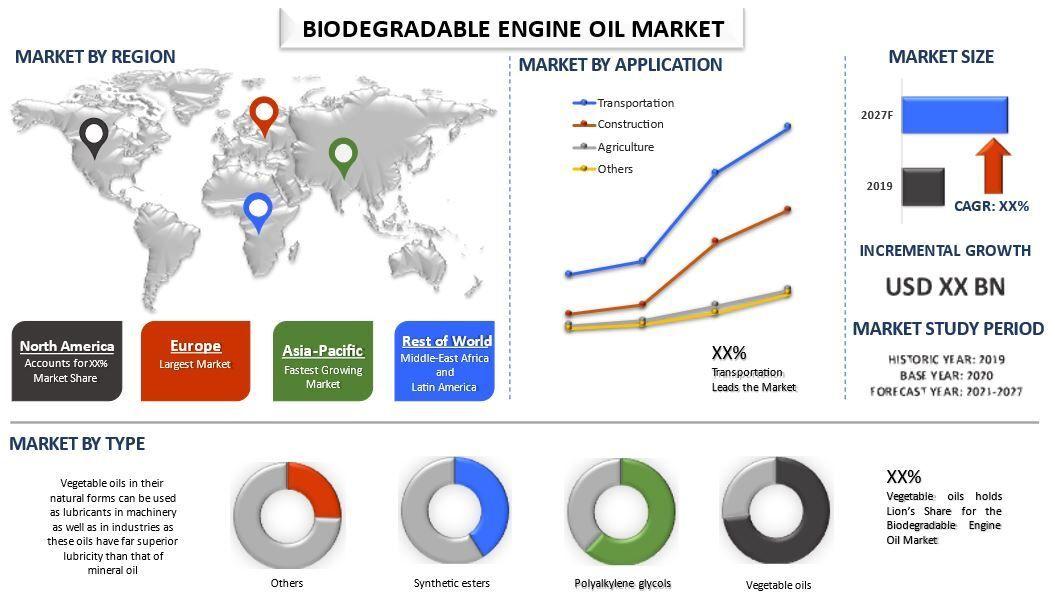Biodegradable Engine Oil Market Report, Segments, Share, Trends & Forecast 2027

According to UnivDatos, the biodegradable engine oil market was valued at around USD 900 million in 2020 and is projected to grow at a CAGR of 4% between 2021 and 2027. This growth is supported by government initiatives aimed at reducing dependency on petroleum-based lubricants. For example, regulatory bodies in Europe and Canada are considering mandates for the use of bio-lubricants in forestry equipment and heavy machinery.
The global Biodegradable Engine Oil Market is gaining momentum, driven by the rising number of operational vehicles and growing concerns over carbon dioxide (CO₂) emissions. Increasing passenger car sales, particularly in major automotive markets such as Japan, the United States, Germany, and India—which collectively accounted for 62.19% of global passenger car sales in 2020—are contributing to demand growth. Transportation remains a significant emitter of CO₂, with passenger vehicles including cars and buses responsible for over 45% of transport-related emissions, according to 2018 data from Our World in Data.
One of the key factors propelling the market is the global shift toward bio-based alternatives. Historically, biodegradable lubricants derived from animal fats and seed oils were in use long before petroleum-based lubricants were discovered. Their adoption saw surges during World War I and II due to oil shortages, and again during the 1978 OPEC oil embargo. Today, the push toward eco-friendly lubricants is reinforced by environmental regulations, sustainability initiatives, and consumer awareness about reducing the ecological impact of vehicle maintenance. Biodegradable oils offer several advantages over mineral oil products, including higher biodegradability, reduced toxicity, and lower environmental persistence.
COVID-19 Impact on Market Dynamics
The COVID-19 pandemic created unprecedented challenges for the biodegradable engine oil industry. In 2020, global GDP contracted by approximately 4.5%, translating into an economic loss of nearly USD 3.94 trillion. Lockdowns, travel restrictions, and temporary closures of research facilities disrupted the oil and lubricants supply chain. The transportation and automotive sectors—key consumers of engine oil—were severely affected, leading to a short-term demand slump. However, as economic activities resume and governments push for green recovery plans, the market is expected to rebound steadily.
Access sample report (including graphs, charts, and figures): https://univdatos.com/reports/biodegradable-engine-oil-market?popup=report-enquiry
Segmentation Insights
- By Type: The market is segmented into vegetable oils, polyalkylene glycols, synthetic esters, and others. Vegetable oils dominated the market in 2020 due to their higher biodegradability—over 70% compared to 15–35% for petroleum oils.
- By Application: The transportation sector led in both revenue and growth rate, fueled by the rising global vehicle fleet. In the U.S. alone, 276 million motor vehicles were registered in 2019. Other applications include agriculture, construction, and industrial machinery.
Regional Analysis
Europe held the largest market share in 2020 and is expected to maintain its dominance through 2027. This growth is supported by stringent environmental policies and initiatives such as Germany’s “Market Introduction Program (MIP) Biolubricants and Biofuels,” which incentivizes the replacement of mineral oil lubricants with renewable alternatives containing over 50% bio-based content.
Competitive Landscape
The market features several prominent players, including Siemens, BP, Castrol, Royal Dutch Shell, Repsol, Croda International plc, FUCHS Group, Total Lubricants, Condat, and SKF. Companies are focusing on product innovation and regional expansion to gain a competitive advantage.
- In October 2019, Biosynthetic Technologies launched a high-performance biobased synthetic motor oil using high-oleic soybean oil grown in the U.S.
- The same month, Fuchs Lubricants expanded its biodegradable oil portfolio with PLANTO MOT SAE 10W-40, designed for diesel engines in both off-road and commercial vehicles.
Conclusion
With the dual forces of environmental regulation and consumer demand driving change, the biodegradable engine oil market is poised for steady growth. As industries and governments increasingly prioritize sustainability, biodegradable lubricants are emerging not just as an eco-friendly choice, but as a strategic necessity in the automotive and industrial sectors. Manufacturers that invest in R&D, sustainable sourcing, and compliance with evolving environmental standards will be best positioned to capitalize on the market’s expanding opportunities.
Contact Us:
UnivDatos
Contact Number - +1 978 733 0253
Email - contact@univdatos.com
Website - https://univdatos.com
Linkedin- https://www.linkedin.com/company/univ-datos-market-insight/mycompany
- Art
- Causes
- Crafts
- Dance
- Drinks
- Film
- Fitness
- Food
- الألعاب
- Gardening
- Health
- الرئيسية
- Literature
- Music
- Networking
- أخرى
- Party
- Religion
- Shopping
- Sports
- Theater
- Wellness


